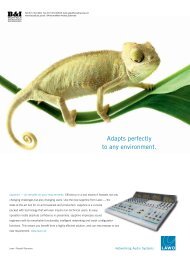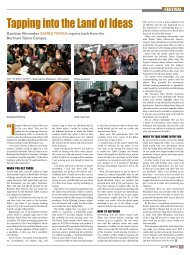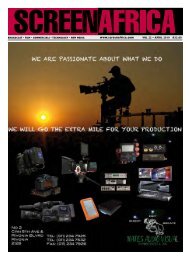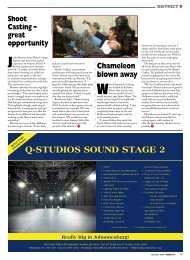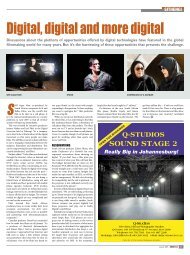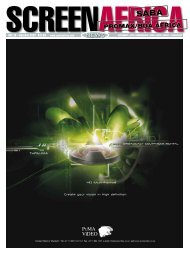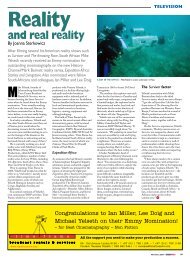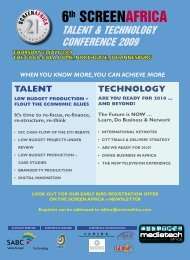Case C - Screen Africa
Case C - Screen Africa
Case C - Screen Africa
Create successful ePaper yourself
Turn your PDF publications into a flip-book with our unique Google optimized e-Paper software.
pay-tv players Muscle up<br />
equipment supplier sector. Telkom Media was at the forefront<br />
of assessing its technology requirements by attending the<br />
IBC broadcast and digital media exhibition in Amsterdam<br />
in September. <strong>Screen</strong> <strong>Africa</strong> has learnt from reliable sources<br />
that Telkom Media has already appointed three consultants,<br />
namely Television Systems Ltd (TSL), a UK-based creator<br />
of integrated broadcast systems and a supplier of broadcast<br />
products; internationally-based Ascent Media Consulting<br />
Services which is currently a consultant for the SABC; and<br />
local broadcasting company Spescom.<br />
E.sat, sister company of South <strong>Africa</strong>’s first free-to-air<br />
channel, e.tv, is expected to engage UK-based broadcasting<br />
systems integrator, Magahertz Broadcast Systems Ltd, as its<br />
main consultant. Megahertz was involved in the installation<br />
and equipping of much of e.tv’s facilities when the channel<br />
was first launched.<br />
At the time of going to press which was only two weeks after<br />
the ICASA announcement, it was already clear that the five<br />
pay-TV broadcasters were preparing to compete head on with<br />
each other to ensure strong positioning in the subscription<br />
arena.<br />
Key to gaining position in the pay-TV market will be the<br />
date by which the new contenders launch their services and<br />
the entry subscription rate they offer. ODM’s general manager,<br />
Vino Govender, said its pay-TV service would launch a unique<br />
40-50 channel digital satellite pay-TV bundle some time in the<br />
second half of 2008.<br />
Govender revealed that ODM would invest R1.2bn before<br />
going operational to expand the viewing choices for a<br />
larger portion of the population in South <strong>Africa</strong>. The ODM<br />
consortium is reportedly backed in part by the South <strong>Africa</strong>n<br />
arm of SES, the Luxembourg-based satellite group, together<br />
with the quasi-government owned Industrial Development<br />
Corporation (IDC) and the investing arm of the trade union<br />
Cosatu. Its service price will range from between R149 to<br />
R369 for a full offering. Users will be able to pay only for what<br />
they want, which would allow subscribers to create their own<br />
bundles. Govender predicted that approximately 1.8 million<br />
subscribers who previously could not afford DStv would<br />
migrate to the less expensive ODM.<br />
Also promising to be on air in Q2 2008 is Telkom Media,<br />
part of South <strong>Africa</strong>’s telecommunications giant Telkom. It<br />
has announced a 15-channel bouquet which includes a 24hour<br />
news channel which will be headed by Jimi Matthews,<br />
former SABC and e.tv chief of news. Two factors give Telkom<br />
Media a significant advantage: firstly, its comprehensive fibre<br />
network, which will enable it to deliver content to subscribers<br />
cheaply and effectively. Secondly, it has a whopping R7bn<br />
budget with which to launch its subscription broadcasting,<br />
video-on-demand and television-via-broadband services.<br />
Telkom Media is set to offer middle-income consumers a<br />
range of sports, movies, music and educational channels for<br />
less than R100.<br />
The religious satellite broadcaster Walk on Water has said it<br />
could be up and running as early as this Christmas. It aims to<br />
offer a wide range of programmes based on “Christian lifestyle<br />
principles”. It sees its support coming from Christians whom it<br />
ayanda WIns BotsWana tender<br />
from all the major news and production server system<br />
suppliers in late 2006. “Key criteria were to maintain the<br />
professional advantage by improving further on the workflow<br />
and adding capacity to our channel,” says Kingsley Reetsang,<br />
General Manager (Engineering Services) Botswana Radio &<br />
Television.<br />
As part of extensive investment in new infrastructure, BTV<br />
has purchased two Enterprise sQ systems, one each for the<br />
newsroom and transmission area, as well as a number of sQ<br />
Edit Plus craft editors and graphics paintboxes. The order<br />
includes four servers plus more than 30 journalist workstations.<br />
Installation at BTV will take place over the next few months.<br />
AMT was also awarded the tender for the Media<br />
Management solution and is presently preparing to install the<br />
internationally developed solution.<br />
“AMT secured the latest contract after satisfying the criteria<br />
set out in the tender,” says Dennis Herold, General Manager<br />
of AMT.<br />
says form 80% of the South <strong>Africa</strong>n population. It is unclear at<br />
what subscription rate it intends to enter the market.<br />
E.sat has planned for 21 channels, based on movies, sport<br />
and including a 24-hour news channel. Although e.sat has<br />
not confirmed a launch date, in order to make it competitive<br />
it will have to be on air within the next 12 to 18 months.<br />
Stakeholders in e.sat are Hosken Consolidated Investments<br />
(HCI) and Venfin. Chairperson of e.sat is Marcel Golding, who<br />
has gained valuable broadcasting experience from heading<br />
e.tv and is engaged on an <strong>Africa</strong>n broadcast acquisition trail.<br />
During e.sat’s presentation to ICASA, Golding was crossquestioned<br />
by ODM on whether there would be double<br />
employment of staff by e.tv and e.sat. He said this could only<br />
occur among senior management who would oversee both<br />
operations. There would be “no cross-subsidiaries in costs and<br />
staff between e.tv and e.sat”. Golding has yet to reveal e.sat’s<br />
entry subscription level.<br />
MultiChoice has a clear advantage over the other operators.<br />
For one, it will not have the enormous start-up costs associated<br />
with satellite TV. It has had a monopoly position up to now and<br />
has been able to establish an impressive pay-TV and Internet<br />
subscriber base of more than one million customers.<br />
It has also tied up strong content, which will appeal to South<br />
<strong>Africa</strong>n viewers. One of its DStv channels, SuperSport, was<br />
awarded a R6bn broadcast soccer rights deal by the Premier<br />
Soccer League (PSL) which presents a huge sports viewing<br />
attraction to existing and new subscribers. That MultiChoice<br />
is intent on offering top entertainment is evident from its<br />
new raft of bouquet channels, namely M-Net Stars, Sony<br />
Entertainment TV, Animax, One Gospel, plus an unnamed<br />
“lifestyle” channel which is due to kick off in November. It<br />
intends increasing its DStv bouquet by up to 30 video and<br />
audio channels. In preparation MultiChoice embarked on a<br />
shuffle of its DStv bouquet by renumbering its channels from<br />
one or two digits, to three digits on 1 October.<br />
saFta’s BIg nIght<br />
awarded on the first night and the Performance awards on<br />
the second, all categories will be combined in a single threehour<br />
event, to be televised live on SABC2. Outside broadcast<br />
services will be provided by Air Time Outside Broadcasts,<br />
utilising their HD (high definition) unit.<br />
For the second year running, CAP Events has been contracted<br />
by the NFVF (National Film and Video Foundation),<br />
the custodian of the SAFTAS, to stage the event.<br />
Says SAFTAS event producer Mark West: “The decision to<br />
go for a single day event is in line with the major international<br />
awards like the Emmys, Oscars and BAFTAS. A lot of people<br />
are nominated across the categories so rather than spread the<br />
ceremonies over two days, we’re going for a single glamorous<br />
and stylish event. Popular local stand-up comic David Kau<br />
has been signed as our presenter. David will be joined by<br />
personalities from across the film and TV spectrum who will<br />
present the Golden Horn [the official SAFTAS trophy] in the<br />
different categories.”<br />
Approximately 2 000 guests will be invited for the event.<br />
Because of the scale of the show, West has to make use of<br />
a really high end supplier, namely Gearhouse South <strong>Africa</strong>.<br />
“Gearhouse will supply the lighting, sound and AV equipment<br />
and do the lighting design. Gearhouse MD Offer Lapid offers<br />
a lot of input for this event.”<br />
The stage will take up one entire wall of the Gallagher Estate<br />
venue. This and the staircases leading up to the stage will be<br />
constructed by Stage Magic. “Because of the new advanced<br />
digital cameras [ie. Sony XDCAM] which pick up every detail,<br />
we have to make sure that everything fits together exactly.<br />
There will be a single central screen at the back of the stage<br />
and plasma screens behind the podiums.”<br />
The AV for the nominees packages will be done by Rapid<br />
Blue, as well as a special video opening sequence for the event,<br />
much like the Oscars.<br />
There will be a crew of about 110, including the OB<br />
technicians, working on the night of the event event. Runthroughs<br />
will commence four days prior to the event, with a<br />
full dress rehearsal the night before.<br />
Last year’s first night event was struck by lightning just before<br />
it commenced, which resulted in a delay. On the second night<br />
CoNTiNUeD froM PAGe 1<br />
regIonal IntegratIon<br />
on saBa agenda<br />
General Assembly sessions which have sometimes turned<br />
into talk shows. This year’s General Assembly will give us the<br />
opportunity to take stock of the problems SABA faces so that<br />
we can re-organise ourselves to meet the challenges of the<br />
future, such as the 2010 FIFA World Cup in South <strong>Africa</strong> and<br />
the issue of sports rights acquisition as a whole.”<br />
Other keynote topics to be addressed at the General<br />
Assembly are the impact of digital migration for the region’s<br />
broadcasters and the concept and funding of public service<br />
broadcasters.<br />
An organisation devoted to promoting excellence in<br />
broadcasting in the SADC region, SABA is putting a special<br />
focus at this year’s General Assembly on broadcasting reforms.<br />
Members will be asked to present a report on the state of<br />
broadcasting reform in their country. In addition, a SABA<br />
working group established in December 2006 is to present<br />
its report to the conference with proposals for a common<br />
understanding of the concept of public broadcasting in the<br />
region. A study on sustainable income generation for SABA<br />
members will also be presented.<br />
At last year’s General Assembly, SABA president Advocate<br />
Dali Mpofu urged the organisation to become a more<br />
strategically focused and visible association that takes an<br />
activist and interventionist role in upholding democracy in<br />
the region.<br />
Says Lopes: “Following that call, a strategic planning meeting<br />
was held in December to discuss how we could make SABA’s<br />
lobbying mandate more proactive. Due to financial and other<br />
reasons, we could not visit any country in the region, as<br />
envisaged, to pursue our advocacy and support our members<br />
in the reform process. However, we’re obviously hoping to<br />
change this in the future and the first step has been to improve<br />
our communication with members.”<br />
SABA is presently wrapping up its Information 21 Project<br />
within which SADC Calling, a weekly 40-minute programme<br />
featuring news from the SADC region, falls. “This has been<br />
a very successful project which has received lots of positive<br />
feedback. We’re hoping to continue SADC Calling for another<br />
six months at least, but it is all dependent on funding, which<br />
came to an end on 30 September. At the moment we’re<br />
negotiating for further funding. We are also in the process<br />
of completing SADC Vision, which is the visual part of the<br />
Information 21 Project. SADC Vision is a six-part TV series<br />
that profiles the SADC region and includes interviews with<br />
heads of state,” explains Lopes.<br />
Another SABA activity is its Exchange Programme, a training<br />
initiative in which technical broadcast staff visit different<br />
SADC broadcasters for skills transfer. Lopes comments: “We<br />
thought that before we sent people on this programme that we<br />
should run training workshops for producers in preparation.<br />
A workshop for Anglophone producers was recently held and<br />
we are obviously planning to run more.”<br />
The SABA General Assembly each year attracts delegates<br />
from its member countries – Angola, Botswana, DRC,<br />
Lesotho, Madagascar, Malawi, Mozambique, Namibia, South<br />
<strong>Africa</strong>, Swaziland, Tanzania, Zambia, Zimbabwe, Mauritius<br />
and Seychelles. SABA also has international partners such<br />
as the Commonwealth Broadcasting Association (CBA) and<br />
Asia-Pacific Institute for Broadcasting Development (AIBD),<br />
as well as international associate members such as public<br />
service broadcasters BBC and Deutsche Welle.<br />
Originally created to represent public service broadcasters,<br />
SABA’s sphere of activity has been extended to include<br />
associate members who comprise community, private and<br />
commercial broadcasters in Southern <strong>Africa</strong>, the <strong>Africa</strong>n<br />
continent and the rest of the world.<br />
there was a technical hitch when the auto cue went down. Says<br />
West: “The presenter who was at the podium at the time made<br />
rather a meal of it, making sure everyone noticed the hitch.<br />
To prevent that happening again we’re having a meeting in<br />
advance with the presenters to discuss on-stage protocol.<br />
“This year we’re making the show simpler, more glossy,<br />
stylish and elegant. It’s important that the award winners<br />
themselves become the show.”<br />
October 2007 – SCREENAFRICA 51



